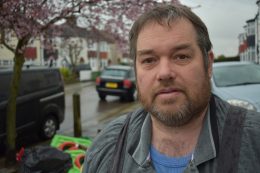SBD Technical Adviser Mark Pollard gives his personal view on why compartmentation in multi-occupancy residential buildings is so important
At our annual National Training Event in Northamptonshire in March, I gave a presentation about compartmentation to more than 200 SBD trained Police Officers and staff who work with the construction industry and local authorities to design out crime. It was an opportunity for me to give my own personal insight, based on my experience as a Beat Officer covering some of South London’s toughest estates.
When I started working for the police during the 1980s – and throughout my career – we would receive lots of calls to estates about low level incidents, such as anti-social behaviour. They were mostly minor matters but could easily escalate and get out of control. For residents living nearby, it could mean a poor quality of life, even if they weren’t victims of crime themselves. For Police, we would attend with at least one other officer, and these incidents used to take up a lot of our time.
One of the problems was that there was free movement on estates for residents and visitors without any controls. People could go anywhere. On one estate in North Peckham you could run three-quarters of a mile using the sky walkways between buildings without your feet touching the ground. When following up a report of an incident, police officers would have to call on lots of front doors to speak to residents about what they had seen and to find out who had buzzed open the communal door. Victims and other residents who helped us faced a real threat of reprisals.
Fortunately, technology in the form of visitor and access control systems, incorporating video monitoring, has come to our assistance and put a stop to free movement. It has disrupted criminal and anti-social behaviour and has led to a fall in crime, although the fear of crime persists.
Modern access control systems on blocks of flats have data logging systems and these can give us all the information we need for investigative purposes. For example, we could find out quickly which flat had been responsible for allowing entry to a large group of youths who would torment children playing in private gardens at 5pm each evening. We could identify the flat and take the evidence to the landlord or management company. With video entry systems, we can identify the culprits.
A development in London had an arson attack at an entrance to a flat which compartmentation would have prevented. The perpetrator had breached an injunction to tailgate his way into a residential block to bang on the door of his ex-girlfriend’s f
Architects and developers will have real aspirations for their buildings at the outset – wanting it to be a great place for people to live. But we know that as construction progresses consultants are brought in, and this could lead to corners being cut to save money, and security itself becoming a victim. Security does cost money, albeit less than it used to, but Police need to present the strongest possible case on behalf of residents who want to be safe and secure in their homes.lat. Whilst she phoned police and kept the door shut, he gathered materials from a storeroom within the building and set light to them outside her flat. Thankfully, help was on its way. That same developer is now very insistent on compartmentation.
What we are recommending does not lead developers into conflict with other areas of the Building Regulations. No one Approved Document takes precedence over another. Plus, our advice has the full support of the Fire & Rescue Services.

I believe passionately, that if we can curtail unlawful free movement, crime and anti-social behaviour will decline. I also believe it would have cost savings too with less demand on police time and local authority resources, such as repairs and maintenance, as well as other knock-on benefits, including a fall in mental health issues and an increase in educational standards. It would be great to see some research carried out to show how much society would benefit.
Mark Pollard: "If we can curtail unlawful free movement, crime and anti-social behaviour will decline"